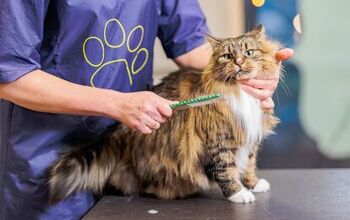First-Ever Test Tube Puppies Born By In Vitro Fertilization

Is it cool or creepy that the first litter of pups conceived through in vitro fertilization have been born? While our collective initial reaction is probably along the lines of a classroom science project gone ethically wrong, it’s actually pretty cool and I’ll tell you why.
The work completed by Cornell University researchers in fact opens the door for conserving endangered canine species, using gene-editing technologies to eradicate inheritable diseases in dogs and for the study of genetic diseases in humans.
Related: Cute Video Explains The Science Of 21st Century Dogs
Alex Travis, associate professor of reproductive biology in the Baker Institute for Animal Health in Cornell’s College of Veterinary Medicine confirms that what makes these findings so exciting is the wide implication for wildlife conservation. Because the sperm and eggs can be frozen and banked for future use, they can be employed in the preservation of endangered species or even rare breeds of show and working dogs.
Researchers have been attempting to produce IVF pooches since the mid-70s, but the tricky canine cycle has made it particularly challenging. In this particular instance, 19 embryos were transferred to the host female dog, who gave birth to seven healthy puppies; two from a beagle mother and a cocker spaniel father, and five from two pairings of beagle fathers and mothers. Klondike was the first puppy born from the frozen embryos – wait a second, isn’t that the name of a frozen ice cream bar?
Related: Science Proves Humans Are Defenceless Against The Power Of Puppy Dog Eyes
According to Travis, researchers may one day be able to remove genetic diseases and traits in an embryo, ridding dogs of inheritable diseases such as lymphoma that Golden Retrievers are likely to develop or urinary stones typical of the Dalmatian. And because canines share more than 350 similar inheritable disorders and traits with humans, the potential for human benefit from this genetic experimentation is unmistakable.
The breakthrough is described in a study that’s published in the journal Public Library of Science ONE.
[Source: Cornell University]

Sharing space with three seriously judgy Schnoodles and a feline who prefers to be left alone. #LivingMyBestLife
More by Mary Simpson























